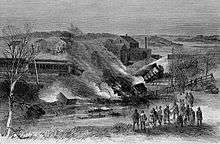Wood River Junction, Rhode Island

Wood River Junction is a small village in the town of Richmond, Rhode Island in the United States. It is home to the Chariho school district's main campus and is otherwise largely turf farms.
Geography
Wood River Junction is commonly considered by locals to be one of the coldest locations in the state of Rhode Island, due to its low-lying and flat geography. It is the home of Meadowbrook Pond, also known as Wood River Pond, a popular fishing and swimming area. It is surrounded by two rivers: the Wood River and Pawcatuck River.
History
Overview
The village is the site of the former Wood River Branch Railroad Station. The Wood River Branch of the New York, New Haven and Hartford Railroad was chartered in 1872 and completed in 1874. On April 19, 1873 a train disaster was caused by a bridge washout and burning of passenger cars.[1] The Branch was built to provide service from the Hope Valley to the main line of the New York, Providence and Boston Railroad and was only six miles long. The New Haven Railroad took over operation of the Branch in 1892 and eventually abandoned it on August 8, 1947. The main line continues in operation today as Amtrak's Northeast Corridor.
Criticality accident
On 24 July 1964, a fatal criticality accident occurred[2] at the Wood River Junction nuclear facility. This facility was designed to recover highly enriched uranium in scrap material from fuel element production. Technician Robert Peabody was working with a tank containing radioactive uranium-235 in a sodium carbonate solution, which was being agitated by a stirrer. Intending to add a bottle of trichloroethylene to remove organics, he erroneously added a bottle of uranium solution to the tank, producing a criticality excursion (uncontrolled chain reaction) accompanied by a flash of light and the splashing of about 20% of the tank's contents (about 10 litres (2.2 imp gal; 2.6 US gal) out of 40 to 50 litres (8.8 to 11.0 imp gal; 11 to 13 US gal), including the bottle contents) out of the tank.
This criticality exposed the 37-year-old Peabody to a fatal radiation dose of "more than 700 rem",[2] which is 7 Sv. He died 49 hours after the incident.
Ninety minutes later a second excursion happened when a plant manager returned to the building and turned off the agitator, exposing himself and another administrator to doses of up to 100 rad (1 Gy) without apparent ill effect.
References
Additional Links
- UNC Recovery Systems - Nuclear Incident at United Nuclear Corporation (8/24/1964)
- UNC Recovery Systems - Compliance Investigation Report Volume 1 - Report Details (9/16/1964)
- UNC Recovery Systems - Compliance Investigation Report Volume 3 - Supplemental Report with Exhibits (9/16/1964)
Coordinates: 41°26′10″N 71°41′40″W / 41.43611°N 71.69444°W
